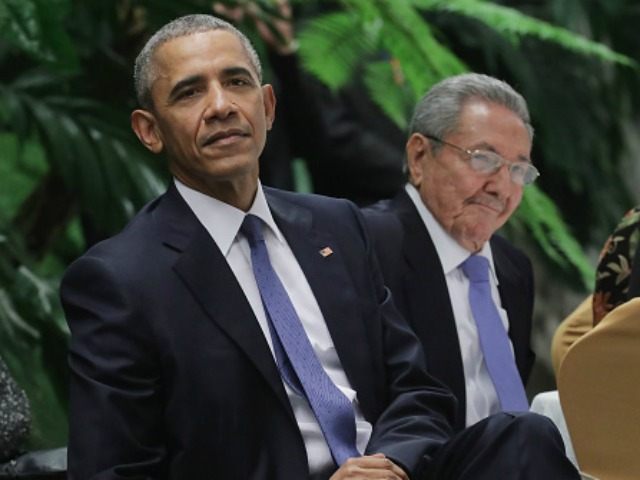U.S. Customs and Border Protection has observed a 500 percent increase in the number of Cuban refugees making the risky voyage out of the country since 2011, with an observable spike following President Obama’s 2014 declaration that he would seek to bring Washington closer to the dictatorship of Raúl Castro.
The Spanish newswire service EFE reports that only 7,787 Cuban refugees arrived in the United States in 2011. That number stands at 353 for the first half of fiscal year 2016. In 2014, the year President Obama announced he would seek diplomatic relations with Cuba, 23,752 Cuban refugees landed in the United States. Nearly double that amount — 40,115 — arrived in 2015.
President Obama visited Havana in March, calling for fostering closer economic ties with the communist nation and sharing an exciting afternoon of baseball with dictator Castro. Castro and Obama did “the wave” together during the game.
The Cuban government conducted 498 politically-motivated arrests during President Obama’s visit. That month, state police conducted 1,416 politically motivated arrests, “the highest [rate] of its kind of abuse for the month in the Western Hemisphere and much of the world currently,” according to the Cuban Commission for Human Rights and National Reconciliation (CCDHRN), which monitors state oppression on the island.
Following his visit, Cubans have been arrested for, among other crimes, welcoming a Havana-approved U.S. cruise ship and going to Catholic Mass on Sundays. Carlos Amel Oliva, a member of the dissident group the Patriotic Union of Cuba (UNPACU), began a hunger strike following a state confiscation of laptops used to create dissident materials.
Guillermo Fariñas, a Sakharov Prize-winning activist, followed suit after police broke two of his ribs during an arbitrary detention. This is Fariñas’s 25th hunger strike, one he threatened he would engage in if he was abused once again in October.
Long before President Obama’s visit, Castro made legal changes that would ensure any profits from expanded business opportunities with American companies would not trickle down to the Cuban people. Two days after President Obama’s 2014 “normalization” speech, Castro announced that the state would force Cuban workers employed by foreign corporations to hand over 92 percent of their salaries, a disincentive to work for private industry.
The result has been an enriched communist state emboldened to oppress an increasingly impoverished people. In January, the U.S. Coast Guard issued a statement noting that they had encountered more desperation and, in some cases, hostility from Cuban refugees found at sea, attempting to navigate makeshift aquatic vessels to the United States, including some refugees inflicting self-harm and drinking bleach when faced with the prospect of returning to Cuba.
While the Cuban government has repeatedly condemned the United States for accepting Cuban refugees as legal exiles upon landing in the country through the Cuban Adjustment Act, Lt. Cmdr. Gabe Somma, U.S. Coast Guard Seventh District spokesman, told Breitbart News in January that the state of the Cuban nation is largely to blame for pushing refugees to risk their lives on the high seas: “There has been a lack of economic improvement and opportunity in Cuba. The internal situation in Cuba is a key push factor in illegal migration from Cuba.”
At the time, the number of refugees trying to flee Cuba had only spiked 350 percent since 2014.
“It is easier to blame the Cuban Adjustment Act than it is to look in the eyes of the Cuban dictator and tell him ‘you are guilty and you must allow your people to develop economically so that they do not continue leaving the country in droves,” Ramón Saúl Sánchez, head of the Cuban exile Democracy Movement advocacy group headquartered in Florida, told reporters following the release of new numbers this week.
In April, shortly following President Obama’s trip to Cuba, Sánchez received a letter threatening his deportation if he did not leave the country. He has lived in the United States for 49 years.

COMMENTS
Please let us know if you're having issues with commenting.